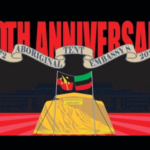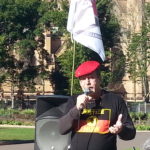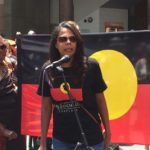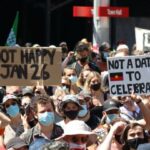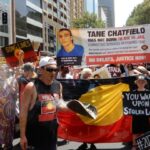The Aboriginal Tent Embassy Doesn’t Support the Voice Referendum
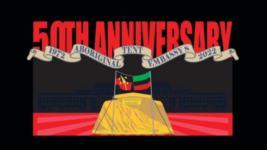
Aboriginal Tent Embassy representatives are asserting that the Albanese government’s prioritisation of the implementation of the Uluru Statement from the Heart is flawed as no real on-the-ground consensus has ever been established with First Nations peoples in this regard.
The main crux of the new government’s initiative is to hold a referendum to establish a constitutionally enshrined Indigenous voice to parliament, which would be a body of First Nations representatives charged with advising government on its approach to Aboriginal affairs.
Released on 26 May 2017 at the National Constitutional Convention, the Uluru Statement sets out a path that aims to overcome the structural racism and injustices First Nations people face in this country, via a process of establishing the voice, followed by treaty-making and then truth-telling.
However, a strong contingent of prominent First Nations rights advocates has always maintained that recognising Indigenous peoples in the Australian Constitution could threaten unceded Indigenous sovereignty and the capacity of an advisory body hardly signals self-determination.
The Tent Embassy is seeking greater consultation on what the new Labor government is proposing, including on the putting of these questions to a national vote, which, again, doesn’t represent an act of First Peoples determining their own future.
A First Nations parliament
“It was a flawed process,” said Aboriginal Tent Embassy ambassador Gwenda Stanley, who was at the National Convention. “It was a proposal that they pushed through without proper consolation and by shutting people down.”
“It needs to be brought back to the people,” the Gomeroi woman told Sydney Criminal Lawyers. “We don’t belong in any constitution. It needs to come back to First Nations people in general, instead of asking the rest of Australia.”
Over a six month period starting in December 2016, twelve First Nations Regional Dialogues were held across the continent to discuss constitutional recognition, which was a campaign to see Indigenous peoples recognised within the founding document, of which they were omitted in 1901.
This process culminated in the National Convention, which resulted in the more robust voice proposal first being flagged to wider Australia. However, those in disagreement walked out of the meeting, claiming they were being shut down and asserting that treaty was the way forward.
“We want our own parliament with our own constitution. We don’t belong in a European-Australian constitution,” Stanley continued. “Let’s have a truth commission. Let’s start talking about reparations. And let’s start talking about the genocide, and how Australia was settled.”
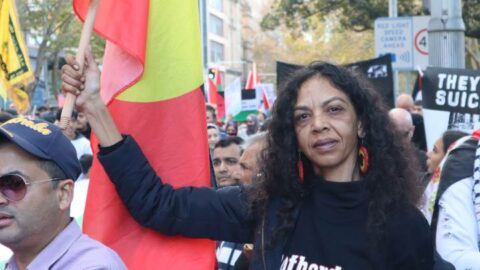
One voice at the table
NSW Aboriginal Land Rights Association chief executive Clayton Simpson-Pitt explains that a small group fronting the dialogues on recognition, which was led by the Cape York Institute’s Noel Pearson, put the voice to parliament proposal to the other delegates as the only option.
Simpson-Pitt and Stanley first met at the February 2017 dialogue that was held in Dubbo, and due to their contributions during the meeting, they were invited to the national conference. Both of them rejected the Uluru Statement and were part of the walkout.
“Noel wrote the proposal and was pushing for it from the get-go, and it was basically being pushed down our throats,” recalled the Ualaroi Kamilaroi Weilwan man. “No one there put the wording of the statement together. The Aboriginal people on the Referendum Council sat down and wrote it.”
“A referendum puts the power in the hands of the rest of Australia. Our freedom is effectively being taken,” the rights advocate added. “We need a national vote with just Aboriginal and Torres Strait Islander people to get a consensus before we ever go to a referendum.”
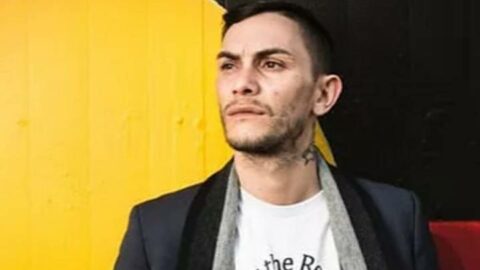
Hard truths must be told
New Indigenous affairs minister Linda Burney is calling on the opposition to open its mind to the voice proposition, which it dismissed in government. And in terms of the Greens differing stance on it, the Wiradjuri woman said she’s “a little confused about what their position exactly is”.
The Greens consider that what’s proposed in the Uluru Statement is in the wrong order, as what’s needed first is a truth-telling commission, which would then lead to an honest treaty-making process, and any talk of a voice to parliament could be dealt with after that.
The party wants to see a Truth and Justice Commission established. Greens Senator Lidia Thorpe was amongst the delegates who walked out of the 2017 National Convention. The Gunnai Gunditjmara and Djab Wurrung woman told the press at the time that treaty was the answer.
According to Stanley, any truth-telling process must include the nation acknowledging the genocide perpetrated upon First Peoples, which involved colonial massacres, their rounding up and being placed in controlled environments on reserves, as well as the taking of land by force.
“The British didn’t come here for a penal colony,” said Simpson-Pitt on the truths to be told. “They came here for an illicit trade in the pretence of a penal colony. They came here to take our land and resources for the better of empire. And we definitely have not ceded our rights to our Country.”
“Is Australia ready for the truth?”
Since taking office, the Albanese government has put First Nations affairs front and centre, whether that be from the appointment of the first Aboriginal woman as a minister, to the inclusion of the Aboriginal and Torres Strait flags at press conferences, to movement on the voice.
Labor has further promised to abolish the racist Community Development Program, the cashless debit card, to increase funding for justice reinvestment projects and to enhance the participation of families in First Nations deaths in custody coronial inquiries.
“That’s just writing in the sand,” said Stanley, adding that the Tent Embassy recently set up a body of representatives from the families involved in the Royal Commission into Aboriginal Deaths in Custody, and it’s calling on the new PM and Indigenous affairs minister to meet with them.
“The Aboriginal Tent Embassy has been around for 50 years, and it’s held many governments to account over that time,” Simpson-Pitt concluded. “The Aboriginal Tent Embassy intends to do the same for the Albanese government. We’ll keep everyone accountable.”


